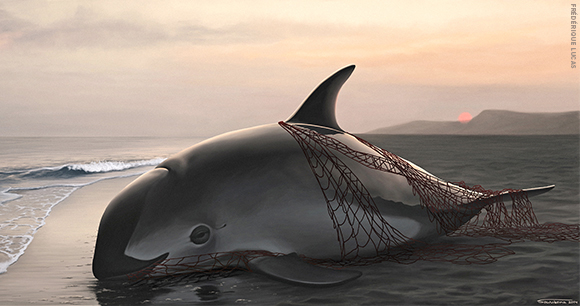
Mexican wildlife leather products, pet reptiles banned from trade
Geneva—The Secretariat to the Convention on International Trade in Endangered Species of Wild Fauna and Flora (CITES) announced today trade sanctions against Mexico for its failure to control illegal fishing and trade that endangers the vaquita porpoise and totoaba fish. As a result, most nations around the globe have been asked to suspend all commercial trade with Mexico in CITES-listed species, amounting to millions of dollars in wildlife products.
Vaquita become entangled and drown in illegal nets set to catch shrimp and fish, including the imperiled totoaba. CITES prohibits international commercial trade in both vaquita and totoaba. Yet poaching and trafficking of totoaba—in demand in China for its swim bladder—has gone largely unchecked for years. As a result, only about 10 vaquita likely remain on Earth.
“The government of Mexico has only itself to blame for these long-overdue sanctions, as multiple administrations have shamefully failed to protect the vaquita—the country’s only endemic cetacean species—from dying in illegal gillnets,” said DJ Schubert, wildlife biologist at the Animal Welfare Institute.
The CITES sanctions suspend all trade with Mexico in any wildlife and plant species listed under the international trade agreement, signed by 184 countries. There are nearly 3,150 Mexican animals and plants listed under CITES, and many of these species are exported. These include lucrative products, such as crocodile leather, mahogany, tarantulas, pet reptiles, cacti, and other plants.
“Mexico is rightly facing the consequences of its failure to control illegal fishing that is causing the vaquita’s extinction,” said Zak Smith, director of global biodiversity conservation at NRDC (Natural Resources Defense Council). “For decades, the international community has been urging, imploring, and begging Mexico to meet its legal obligations. Broad sanctions are appropriate and should stay in place until Mexico demonstrates results.”
Parties to CITES have warned Mexico for years that it must increase enforcement and remove deadly fishing nets from the vaquita’s habitat. Although the Mexican government claims to be committed to vaquita conservation, a report last year by the International Union for Conservation of Nature found that the country continued to allow illegal fishing in the vaquita’s habitat.
As a result, in November 2022, CITES nations directed Mexico to prepare and seek approval of a compliance action plan through the secretariat or face sanctions. The secretariat determined that Mexico’s plan was inadequate, resulting in today’s sanctions.
“While no one relishes economically painful sanctions, all other efforts to prompt Mexico to save the vaquita haven’t been enough,” said Sarah Uhlemann, international program director at the Center for Biological Diversity. “The strongest measures possible are needed to wake up the Mexican government and prompt it to finally save this tiny porpoise from extinction.”
"This CITES decision throws a lifeline to the world's most endangered marine mammal. Mexico urgently needs to implement a robust action plan with clear time frames and corresponding milestones for action, and we urge consumer and transit countries to support Mexico by cracking down on the illegal trade in totoaba fish maws." said Sarah Dolman, ocean campaigner at the Environmental Investigation Agency.
Illegal fishing, which continues in the vaquita habitat, including in the “zero tolerance area” (where only enforcement and research vessels are permitted), is pushing the vaquita toward extinction. Although Mexico has made some progress, recent evidence reveals that illegal fishing activities have increased, with reports of some 200 boats illegally using gillnets to capture totoaba over the past week.
Marjorie Fishman, Animal Welfare Institute
[email protected], (202) 446-2128
Sarah Uhlemann, Center for Biological Diversity
[email protected], (206) 327-2344
Kari Birdseye, Natural Resources Defense Council
[email protected], (415) 350-7562
Paul Newman, Environmental Investigation Agency
[email protected] +44 (0)20 7354 7983
Kate O’Connell, Animal Welfare Institute
[email protected], (en español), (860) 990-7858
The Animal Welfare Institute (awionline.org) is a nonprofit charitable organization founded in 1951 and dedicated to reducing animal suffering caused by people. AWI engages policymakers, scientists, industry, and the public to achieve better treatment of animals everywhere—in the laboratory, on the farm, in commerce, at home, and in the wild. Follow us on Facebook, Twitter, and Instagram for updates and other important animal protection news.
The Center for Biological Diversity (biologicaldiversity.org) is a national, nonprofit conservation organization with more than 1.7 million members and online activists dedicated to the protection of endangered species and wild places.
The Environmental Investigation Agency (EIA) investigates and campaigns against environmental crime and abuses. Our undercover investigations expose transnational wildlife crime, with a focus on elephants, pangolins and tigers, and forest crimes such as illegal logging and deforestation for cash crops such as palm oil; we work to safeguard global marine ecosystems by tackling plastic pollution, exposing illegal fishing and seeking an end to all whaling; and we address the threat of global warming by campaigning to curtail powerful refrigerant greenhouse gases and exposing related criminal trade. More information at https://eia-international.org/
NRDC (Natural Resources Defense Council) is an international nonprofit environmental organization with more than 3 million members and online activists. Since 1970, our lawyers, scientists, and other environmental specialists have worked to protect the world's natural resources, public health, and the environment. NRDC has offices in New York City, Washington, D.C., Los Angeles, San Francisco, Chicago, Bozeman, MT, and Beijing. Visit us at www.nrdc.org and follow us on Twitter @NRDC.